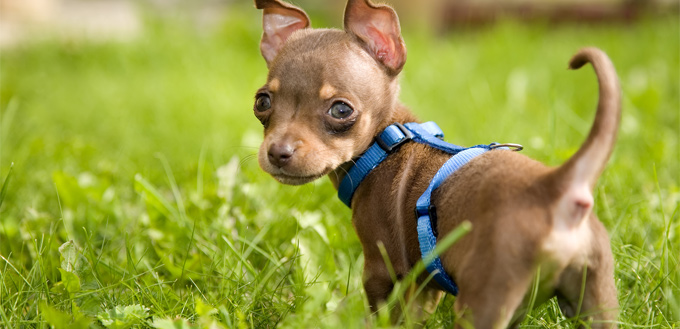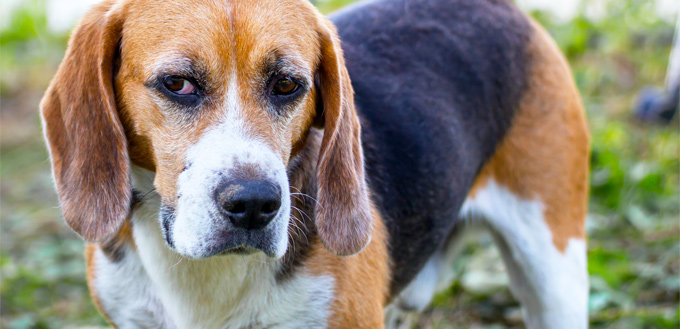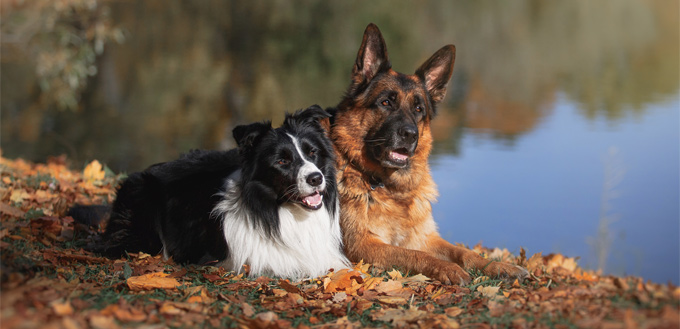Admit it – we’ve all wished at one point or another, that our adorable puppy could stay teeny tiny forever, however inevitably, your little baby will soon grow into a full sized adult dog. It’s a perfectly normal and healthy part of man’s best friend’s life cycle. But how long does puppy hood last, and when will your dog reach their full size? Perhaps you’ve adopted a brand new puppy and they’ve grown larger than you expected – will they ever stop growing on just continue to get bigger and bigger?

How Quickly Do Dogs Grow?
One of the main factors that determine how long a dog will continue to grow is its breed. For example, smaller dogs tend to reach their mature stature at a faster pace than larger breeds. A chihuahua, the teeniest breed of doggo, will have reached their full size between the age of 10 months and one year. Not only do they grow up quicker, but small dogs also reach mental maturity faster than bigger ones. Dr. Jerry Klein, the chief veterinary officer for the American Kennel Club, states “As a rule, smaller breeds mature more quickly than larger or giant breeds.” Dr. Klein goes on to say, “toy breed dogs may reach full growth as early as 9-10 months of age, while some of the giant breeds of dogs may take up to 18-24 months of age to fully attain their final mass and growth.”
Related Post: Best Dog Food for Small Breeds
Small to medium-sized dog breeds, such as beagles, toy poodles, and Cavalier King Charles spaniels, take a little bit longer than their tinier friends to reach their full size. These breeds will have finished growing by about 12 to 15 months old. They will be at their adult weight by around 18 months old. Medium sized breeds, such as labrador retrievers, collies, and Boxers, are fully grown at around 18 months old. It takes them 18 months to reach their adult weight. Large breeds of dogs, like great danes, newfoundlands and mastiffs, will also be fully fledged adult dogs at 18 months. So you while you might have thought that once your puppy hit one year old, they’d be fully grown, it seems if you’ve selected a big dog as your companion, they may be nearing their second birthday before they stop growing!
So why do larger dogs take a longer time to grow into their adult bodies? There’s no definitive answer to this question, however, we can make educated assumptions. For instance, some very small dog breeds remain ‘puppy sized’ once they are fully grown, meaning they physically don’t need to grow as much as, say, a German Shepherd. By contrast, the leap between a German Shepherd’s puppyhood to adult size is quite dramatic, and therefore it stands to reason that it will take some time for the dog to go through the necessary development of bone and muscle to reach their full size.
Puppy’s Development Stages
Although each dog’s development varies from puppy to puppy, there are some stages of growth which are consistent for all of them:
Birth to Three Weeks
Your brand new puppy will be incredibly delicate and dependant on their mother for the first for weeks of their life. Their eyes and ears are closed until two weeks old, so they will mainly interact with their surroundings using their noses. However, at this stage, their world doesn’t extend much further than their mother’s milk!

Three to Eight Weeks
From the age of between three to eight weeks is when puppies begin to understand the world around them, becoming more mobile and playing with their brothers and sisters. At this age, they are incredibly adventurous and brave, despite their small stature. It’s important to allow them to experience new things around their home so that they will be familiarized with different situations.
Two to Three Months
Once a puppy reaches between two and three months, they are much warier, and negative experiences could cause anxiety in later life. It’s at this age that a pup will be allowed outside (provided they have had all the necessary injections needed) and they will begin socialising with other humans and dogs outside of their litter. Dr. Klein urges the importance of praising your little one and speaking to them calmly in the situation that they may find stress, “Positive reinforcement is needed to prevent future mental anxiety.”
Three to Six Months
This is the age range that many dog owners find the most challenging. According to Dr Klein, you should consider the age of three to six months as your puppy’s ‘terrible twos’ stage. They will be much more active and inquisitive about new experiences and will have begun to teeth, which can be very uncomfortable and result in them chewing practically everything, including you! To alleviate your puppy’s discomfort (and yours!), why not purchase a dog chew specifically designed for teething? You can also keep this in the freezing to give your pup a cooling, soothing sensation as they chomp.
Related Post: Best Toys for Teething Puppies and Chew Toys for Puppies

Six to Twelve Months
Once your puppy has reached between the ages of six and twelve months, you’ll start to notice a lot of changes, in both their personality and body. Dr. Klein calls this period the ‘teenage years’, as your doggy will be feeling awkward, both physically and mentally. They will be navigating the world with their not-quite-fully-grown bodies and might be clumsier than usual. In addition to this, they are at their most active and some breeds will even start to develop sexual maturity. If this is becoming a problem, you may want to speak to your vet about the possibility of neutering.
Just like human babies, your precious puppy will develop at their own pace. Be patient with them and always be sure to use positive reinforcement over punishment. Whether you’ve selected a tiny chihuahua or a huge Great Dane, if you train your puppy well, they just might end up being the best friend you could ever hope for.
Note: The advice provided in this post is intended for informational purposes and does not constitute medical advice regarding pets. For an accurate diagnosis of your pet's condition, please make an appointment with your vet.






